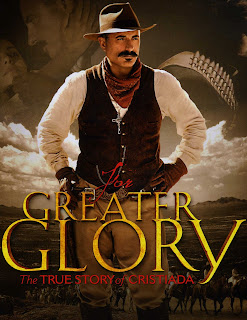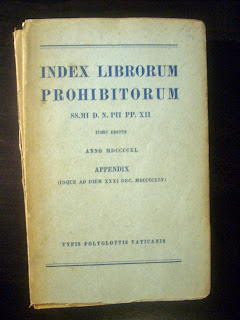"The librarian must be the librarian militant before he can be the librarian triumphant." -Melvil Dewey
Showing posts with label History. Show all posts
Showing posts with label History. Show all posts
28 February 2014
26 February 2014
Monuments Men: Fact and Fiction
It fell short in so many of the ways films fail when they dramatize historical vignettes. With the exception of Jean Dujardin and Cate Blanchett, no members of the main cast were believable as art experts. The way in which the film played-up the team as 'mistfit soldiers' didn't allow the characters' individual stories as artists to breathe. I did enjoy Dmitri Leonidas' portrayal of Sam Epstein (Harry Ettlinger in real life), who had a soft, but striking personal narrative as a Jewish-American immigrant. But mostly, it felt as if I was seeing a caricature of the MFAA, rather than earnest stories.
I was especially disappointed and irritated by the film's portrayal of Rose Valland (Claire Simon in the film-more French-sounding for American audiences, I guess?), who was arguably the most important figure in the preservation and recovery of French art during the war. This unassuming but sharp museum overseer remains one of the most decorated women in French history for her work in the Jeu de Paume during the war. First, the film deprives her of her credit by renaming her character (many of the men in the film kept their real names), and then creates a completely fictional, awkward, and gratuitous sexual tension between her and James Granger (played by Matt Damon). Instead of the intelligent, meticulous, and driven museum patriot she was, these moments in the film make her seem much more like a pathetic old maid who is desperate for male attention. A real missed opportunity to highlight a true heroine of WWII. You can read more about Rose Valland and other women of the Monuments Men here.
Labels:
Archives,
Art,
Censorship,
Europe,
History,
Libraries,
Movies,
Politics,
Preservation,
Reviews
25 January 2014
Battle of the Books
Illustration from Jonathan Swift's 'Battle of the Books' (from 'A Tale of a Tub'), 1704.
In my leisurely stroll through Matthew Battles' Library: An Unquiet History, I've just finished the chapter on Swift's fanciful story of the quarrel between the ancients and the moderns-emblematic of the 17th-18th century public debate over whether modern learning had superseded classical tradition. Here we see one era of books jousting against another, as if the two ages of learning could not occupy the same space (notice the spider and the bee in the upper left). While our present age of enlightenment and 'universal tolerance' leaves more room for the coexistence of modernity and antiquity, we still see the creeping edge of plenty contemporary faddishness competing for, and in many cases, displacing, essential parts of the traditional liberal arts curriculum. It is becoming increasingly common for students to progress through high school and college without reading large chunks of Shakespeare, Dante, or even staples of American literary tradition, like Walt Whitman. Sometimes it leaves one to wonder if modernity has indeed won--not for its merits and might but instead because of its novelty.
Read more about Battle of the Books here.
21 January 2014
Latvians Form Human Book Chain to Transfer Books to New Library
Over the weekend in Riga, Latvia, over 15,000 people gathered to form a human chain stretching more than a mile across the Daugava River to transfer books from the current national library to the new building set to open in August. The event was reminiscent of 1989 Baltic Way, when 2 million people formed a human chain across Estonia, Latvia, and Lithuania.
And it looks like they all had a good time doing it too.
13 April 2013
Roosevelt Island: Confrontational Reading
I rarely ever carry my camera with me, especially on long runs and hikes (too much looking through the lens instead of at what's in front of it), but I wish I had brought it along on my run this morning. On my trek over the river, I spent some time at the Theodore Roosevelt Memorial on the island. Flanking the central statue of Roosevelt himself are four giant stone panels with some of his most memorable words. A nice little hidden inspirational place. Below is an image of one of the panels. I have reproduced the text of the others below. I was so struck by the timeliness of Teddy's proverbs. Hardly anyone seems to favor 'righteousness over peace' anymore. Conservation, both in respect to natural resources and intellectual and cultural heritage, continues to have a reputation as a static, rather than dynamic activity. And the world, in various regions, seems unduly obsessed with 'order without liberty' and promoting 'liberty without order.' I just love how the bold and chiseled words confront and challenge the viewer so directly (each panel is probably taller than 20'). I think public sculpture plays a surprisingly important role in nurturing contemplation, especially when books are increasingly being sold and consumed as entertainment.
MANHOOD
A man's usefulness
depends upon his living up to
HIS IDEALS
in so far as he can
10 October 2012
Quo Vadis: What is the Future of Catholic Libraries?
Catholics and other individuals who want to read good Catholic books faced with this situation today have a few options:
- Request the desired titles at the local public library. Wait an eternity for them to be ordered and processed if the library does not own the item(s) already and actually decides to purchase them.
- Exercise their resourcefulness by scouring all the local parish and university/seminary libraries. Even if the desired title is found, access to it is usually restricted by parish membership or university affiliation (which in some cases can be purchased for a fee of $50/semester).
- Just buy the darned thing, ensuring relatively quick and on-going access for reading and reference.
03 October 2012
Wherein I Rant about Banned Books Week
It is that time of year again. The week when nearly every librarian and their brother give enthusiastic exhortations to "Read Banned Books!" and proceed to superficially discuss the importance of 'intellectual freedom.'
It would be an understatement to say that I am deeply exasperated by the annual celebration of Banned Books Week. Like a lot of other ALA advocacy efforts, it is emotionally charged, politically correct, and does not facilitate a rich discussion of the issues it aims to address. I hope this post enables a bit of that discussion. My heart was warmed earlier this week by a post from Annoyed Librarian which addresses the mis-direction of Banned Books Week. Like many modern librarian activities, it involves a healthy dose of pretend progressivism:
In regards to the discussion of intellectual freedom and 'spreading awareness' about the lingering impact of censorship in today's libraries, I am almost always disappointed by the tone of articles, blog posts, etc. that inevitably end in a disparagement of so-called 'inquisitionist' or 'crazy' parents who wish to thrust their mind control upon the rest of society. While it is true that virtually all instances of what are now colloquially referred to as 'book banning' are mere challenges placed by individual parents in school or public libraries, many parents who submit such challenges do so with the good intentions of properly stewarding their children's media consumption. I still think it is naive of them to presume that all libraries, even the children's section, are completely tailored to their value system and parenting methods, and also think it is silly to think that said libraries should be punished just because you did not double-check junior's book bag. Nonetheless, this is the very population of 'pro-censorship' people that Banned Books Week Advocacy seems to be aimed at, yet I rarely hear anyone charitably engage book-challenging parents in a logical dialog about why censorship might be problematic. Such respect is often feigned, albeit well, by reference desk staffers with short tempers. Usually what one hears is akin to "Stop being difficult. You are annoying. We are right. You are wrong. Read banned books!"So much for library neutrality.
Aside from its feigned radicalism, my two biggest criticisms of Banned Books Week are 1) that it only perpetuates myths and misconceptions of censorship rather than educating the public about reality and 2) its false subversiveness and one-dimensional slogan do not encourage the public, whether young or old, to critically examine their attitudes about reading and media consumption.
It would be an understatement to say that I am deeply exasperated by the annual celebration of Banned Books Week. Like a lot of other ALA advocacy efforts, it is emotionally charged, politically correct, and does not facilitate a rich discussion of the issues it aims to address. I hope this post enables a bit of that discussion. My heart was warmed earlier this week by a post from Annoyed Librarian which addresses the mis-direction of Banned Books Week. Like many modern librarian activities, it involves a healthy dose of pretend progressivism:
"This is such a typically radical librarian thing to do: pretend to be subversive and daring by doing something that's not remotely prohibited by law, including some apparently xenophobic laws in Arizona. Unless the underground librarians are planning to sneak into classrooms and start teaching kids Sandra Cisneros, all the feelgood drama is completely unnecessary."As someone who doesn't abide by the ALA's fake subversiveness, I guess I get a prize for having a truly radical librarian view (?).
In regards to the discussion of intellectual freedom and 'spreading awareness' about the lingering impact of censorship in today's libraries, I am almost always disappointed by the tone of articles, blog posts, etc. that inevitably end in a disparagement of so-called 'inquisitionist' or 'crazy' parents who wish to thrust their mind control upon the rest of society. While it is true that virtually all instances of what are now colloquially referred to as 'book banning' are mere challenges placed by individual parents in school or public libraries, many parents who submit such challenges do so with the good intentions of properly stewarding their children's media consumption. I still think it is naive of them to presume that all libraries, even the children's section, are completely tailored to their value system and parenting methods, and also think it is silly to think that said libraries should be punished just because you did not double-check junior's book bag. Nonetheless, this is the very population of 'pro-censorship' people that Banned Books Week Advocacy seems to be aimed at, yet I rarely hear anyone charitably engage book-challenging parents in a logical dialog about why censorship might be problematic. Such respect is often feigned, albeit well, by reference desk staffers with short tempers. Usually what one hears is akin to "Stop being difficult. You are annoying. We are right. You are wrong. Read banned books!"So much for library neutrality.
Aside from its feigned radicalism, my two biggest criticisms of Banned Books Week are 1) that it only perpetuates myths and misconceptions of censorship rather than educating the public about reality and 2) its false subversiveness and one-dimensional slogan do not encourage the public, whether young or old, to critically examine their attitudes about reading and media consumption.
09 August 2012
St. Lawrence Day!
Tomorrow, August 10th, is the feast of St. Lawrence of Rome, deacon, really stellar martyr, and patron of, amongst other things, librarians. When once asked to produce the treasures of the Church, St. Lawrence is said (by St. Ambrose, no less) to have gathered all the poor together and presented them as the true riches to be sought.
 |
| Sixtus ordains St. Lawrence |
St. Lawrence was brutally martyred by being roasted alive. Legend has it that he possessed so much fortitude and good humor that, after being thoroughly toasted on one side, he alerted his executioners: "I am done on this side-you can turn me over now!" I have a feeling he did not want his martyrdom to be 'over-easy'.
This makes me wary of the possibility that I may share this fate with a patron of my profession. St. Lawrence's patronage of cooking and comedy is sensible, but it is at least a little ironic that a man who was burned alive now serves as a patron for a profession for which fire is highly dreaded. Perhaps a divinely guided pre-meditation to the cautionary tone of Fahrenheit 451?
In addition to St. Lawrence, Sts. Jerome and Catherine of Alexandria have been claimed as patron saints of libraries and archives. Triple the opportunities to celebrate. Let's hope that nobody calls for a roasting of librarians anytime soon.
 |
| Martyrdom of St. Lawrence, Valentin de Boulogne |
19 June 2012
June Mash-Up
A move, a marathon, and matrimonial celebrations have turned June into a perfect storm for derailing my blogging efforts. After all this activity, and at long last valiantly conquering the ISP tyrants, I am now back online. Inevitably, this hiatus has come at a time where I have far too many things to write about. In an attempt to cover some of this ground, I have herded some snippets together so my thought corral does not bulge too much.
Speaking of censorship, I am tremendously delighted to be the new owner of a 1940 copy of the Index Librorum Prohibitorum. After a quick look through, I'm not sure what the historical fuss was/is all about, even at that time. Few popular novels and literature were on the list, which was mostly focused on published works that include serious doctrinal error on religious matters, although there was a general provision that covers heretical books, and most works of some notable authors, e.g. Nietzche, fall under that category. Some works by Kant and Machiavelli, however, did make the 1940 Index explicitly. The next time one of my colleagues starts hyper-ventilating about the "Church's Banned Books List," I really hope they take my suggestion to actually study the real Index. I'm still seeking out a good book that covers the actual history and use of the Index, since there is so little that I know and understand about it myself.
--1--
I have thus far avoided doing reviews for this blog, since they have a tendency to quickly turn into overwrought intellectualized op-eds, but I think this has to change soon, lest I become too much of a quietist. Some friends of mine are often surprised at how much I follow movies. This is more a symptom of habits acquired on the job last year than any natural inclination, but I am a natural critic (on occasion I've been ordered not to say anything after viewing a movie for the sake of not prematurely ruining the experience for others). This summer's theater line-up includes several highly-anticipated movies, among them "For Greater Glory." On the heels of all the anticipation, I went to the theater opening weekend. I came out of it wishing I was from south of the border. Several other bloggers have published detailed reviews, including both rants and raves, so I won't beat this horse to death. Despite some of the more critical reviews, I found this film very moving, especially for its portrayal of Bl. Jose Sanchez del Rio. "For Greater Glory" has its flaws (unremarkable score, time restraints curtailed some character development, some slightly off liturgical details), but they don't define the film. The story could have benefited from a more raw portrayal of the main character's internal conflicts, but still a film worth seeing, and a story that needs to be told.
--2--
The past several weeks have seen a wide-spread bemoaning of libraries who have opted to take Fifty Shades of Grey off their shelves. What has resulted is a typical flip-flopping of the title going in and out of circulation, depending on the library and the response of the public. What has once again come to light is the discussion of how libraries select for their collections and how they enforce their circulation and collection policies, along with hefty debate over whether or not porn or erotic lit has a place in libraries. Some argue that removing Fifty Shades of Grey from circulation would be inconsistent, since most libraries have an entire section dedicated to Romance novels, to which I say that if you really can't live without your Danielle Steele, county taxpayers shouldn't be enabling your bad habits. How exactly do romance novels and erotic lit fit into the pursuit of upholding Enlightenment values? It's still ridiculous that some public libraries have decided not to install porn filters out of concern for 'intellectual freedom.' To the best of my knowledge, porn filters aren't expansive enough to prohibit the average patron's internet-browsing needs.
--3--
Labels:
Banned Books,
Books,
Censorship,
History,
Jesuits,
Libraries,
Mail,
Movies,
Philosophy,
Saints,
Vatican
22 April 2012
Preservation Week: April 22-28, 2012
It is quite busy as this last semester comes to a close, but this week is also Preservation Week! As I currently work in preservation, and since conservation served as my first window into the world of librarianship, I have a soft spot for preservation in my heart.
Everyone who uses libraries plays a role in the preservation process. Just by keeping food & liquids away from books, refraining from marking in library materials, and carefully handling them, you are helping library items last longer. But when books fall victim to aging, wear and tear, and natural disasters, conservators come to save the day.
In a sense, library preservation owes a great deal to mother nature. The 1966 floor of the Arno river in Florence, Italy was the mother of all modern library disasters. Alli Burness has a great post about the event here:
In a sense, library preservation owes a great deal to mother nature. The 1966 floor of the Arno river in Florence, Italy was the mother of all modern library disasters. Alli Burness has a great post about the event here:
Subscribe to:
Posts (Atom)






